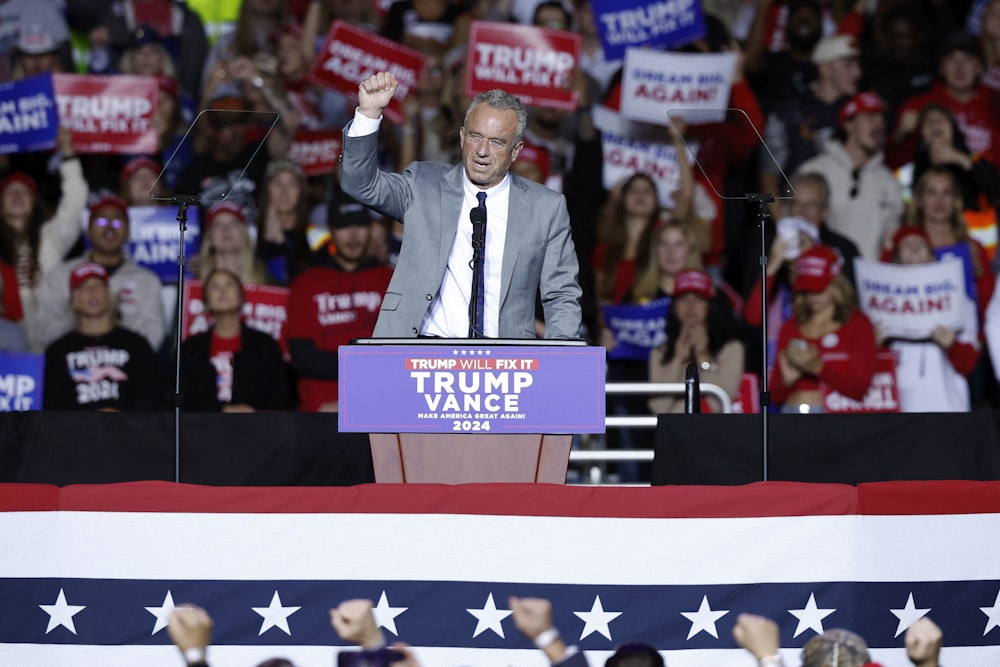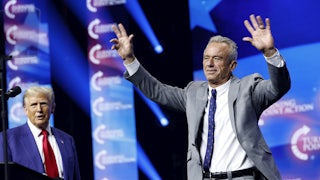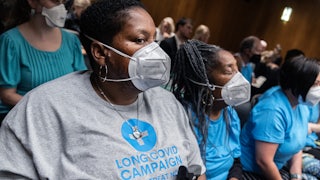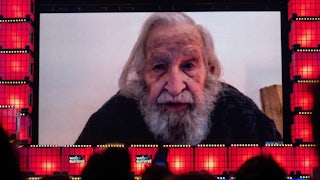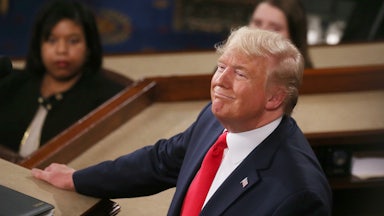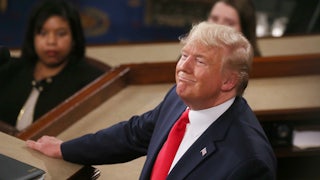He is the most influential anti-vaxxer in the world, one of the “Disinformation Dozen.” He is an AIDS denier who has revived old conspiracy theories about HIV. He claims that Covid was “ethnically targeted” to spare certain groups of people and that Anthony Fauci and Bill Gates are part of a “vaccine cartel” that produces fake studies in order to impose global lockdowns and 5G. And now, he is Trump’s pick to lead Health and Human Services, overseeing health agencies that cover food and drug regulation, infectious and chronic disease prevention, health research, Medicare and Medicaid, and more.
Robert F. Kennedy Jr. has promised to empty entire departments and change the focus of public health to his pet projects—banning everything from Cheez-Its and mayonnaise to water fluoridation and children’s sunscreen while promoting raw milk, ivermectin, and supplements. But his biggest legacy has been seeding mistrust and fear about vaccines among the American public. As recently as last summer, he’s said vaccines cause autism, a lie that was thoroughly debunked decades ago, and he’s said the Covid vaccine is the “deadliest vaccine ever made” based on, apparently, mortality data from Covid itself. As the nation’s top health official, Kennedy could vastly reduce vaccination rates in this country—and even reduce the availability of the vaccines themselves.
“I think many of us are worried that this lack of basic training, concerning comments regarding public health interventions, and anti-vaccine sentiments, are all going to impact support for vaccine development and access, translating to significant public health risks while undermining trust in public health,” Saskia Popescu, assistant professor of epidemiology and public health at the University of Maryland School of Medicine, told me.
Once RFK Jr. has access to federal data on vaccine safety and efficacy, he’ll be able to prove vaccines aren’t safe, Howard Lutnick, co-chair of Trump’s transition team, said two weeks ago. “And then if you pull the product liability, the companies will yank these vaccines right off of the market.” Lutnik seemed to be referring to a law Congress passed in 1986 that shielded vaccine makers from liability after concerns about the safety of a vaccine (later proven to be unfounded) caused some manufacturers to stop making vaccines for fear of lawsuits. Kennedy wouldn’t be able to reverse the law without an act of Congress. But there are other actions he could take at the regulatory level.
The most pressing question: Could Kennedy actually pull vaccines from the market? Yes, it’s possible—but it’s a complicated process that would outrage the public and face numerous immediate court challenges. “Vaccines aren’t coming off the market,” Georges Benjamin, executive director of the American Public Health Association, told me. But there is plenty that anti-science officials like RFK Jr. can do to “gum up the works,” he added, including destroying trust, changing recommendations, and slowing or stopping the approval of new vaccines.
“Taking vaccines off the market will be hard, because you would need to go through the FDA process—with potential procedural obstacles—and then, when the inevitable lawsuits come up, withstand arbitrary and capricious review,” Dorit Reiss, professor of law at UC Law San Francisco, told me in a message. “However, he could slow down or stop approval of new vaccines.”
Under Kennedy’s guidance, federal agencies could also change recommendations on who should receive vaccines. Florida, for instance, doesn’t recommend Covid vaccines for healthy children or booster shots even for those most at risk. Kennedy has indicated that vaccination would become an individual choice, instead of a recommendation or a mandate, claiming that he won’t take away vaccines from people who want them but that he will “make sure scientific safety studies and efficacy are out there, and people can make individual assessments about whether that product is going to be good for them.”
There could be enormous ripple effects from changes to vaccine recommendations. For example, the Affordable Care Act requires insurance providers to cover vaccines recommended by the Centers for Disease Control and Prevention, Reiss said. “So if they don’t recommend hepatitis B for newborns and infants, that’s not covered by insurance under the ACA anymore.” Vaccination rates could plummet from the increased cost alone.
Then there’s the question of vaccine requirements. Trump has repeatedly vowed to withhold federal funding from schools with vaccine requirements. But vaccine requirements for attending school and getting certain jobs, including in health care, are usually set at the state and local level, and federal funding to states cannot be coercive—the feds can’t make states create new laws or rules. Instead, by chipping away at vaccine recommendations, officials could create a climate of vaccine avoidance and skepticism that could be weaponized locally by anti-vaccine groups eager to change the laws and weaken requirements, Benjamin said. And, Reiss said, “making vaccines less accessible can lead states to revoke mandates.” Ironically, such a decision could also make vaccines available through schools and other institutions, she said. States, “if they can afford it,” could push back and instead “offer free vaccines through clinics.”
Kennedy could have a hand in selecting the heads of agencies like the CDC and the Food and Drug Administration to install like-minded allies in these positions. Even if an agency is led and staffed with people resistant to his agenda, Kennedy could still overrule their decisions. Usually, the HHS oversees agencies and doesn’t interfere much with how agency leaders and the rank and file carry out their work. But the secretary actually has a fair amount of legal authority to exert.
In 2011, Kathleen Sebelius, then the HHS secretary, made an unprecedented move. The FDA recommended making Plan B emergency contraceptives available over the counter to anyone, regardless of their age, after reviewing a wealth of evidence indicating the contraceptives are safe and effective. But for the first time ever, the HHS secretary overruled the FDA’s decision, blocking access to the medication. Ultimately, a U.S. judge ruled a year and a half later that Plan B should indeed be sold over the counter to anyone who needs it. The FDA has legal requirements to base its decisions on scientific evidence, the court said; decisions can’t be arbitrary.
Joshua Sharfstein, a former FDA official and now a professor at the Johns Hopkins University School of Public Health, believes this system of legal requirements will keep regulatory agencies in check. “It’s important to remember that agencies like FDA have to follow the law, and the law requires that decisions be made on the basis of evidence—not on the whim of a politically appointed leader,” Sharfstein said. RFK Jr. faces “enormous opposition” within public health, and “there will be battles,” Benjamin said. It’s less a question of what officials like Kennedy can do, and more about how the rest of the country, including public health experts and the courts, will respond. “They can try anything. But there’ll be a lot of people, starting with my organization, that will do everything they can to keep that from happening.”
At the very least, Kennedy will greatly undermine trust in vaccines. “If he continues promoting anti-vaccine policies, we’ll have less people taking vaccines, which are safe and effective, and we’ll have more people getting vaccine-preventable diseases. That’s what’s going to happen,” Benjamin said. “When the federal government says you shouldn’t trust something or creates an ambiguity about something, people do listen, and so that’s where the confusion will reign.”
The assault on vaccines in recent years from anti-vaxxers like Kennedy has been painfully successful. More Americans, especially Republicans, now believe vaccinations aren’t important. Among children entering kindergarten in 2023, 92.3 percent had received the diphtheria, tetanus, and pertussis vaccine (DTaP) and 92.7 percent had the measles, mumps, and rubella vaccine (MMR)—a rate that’s lower than the goal of 95 percent and dropping. Polio and chickenpox vaccination also fell among kids entering school in 30 states last year. Even though these changes seem small, they have enormous effects. This has already been one of the worst years for measles cases in the U.S. in two decades. Globally, measles cases jumped by 20 percent last year, with more than 10.3 million people around the world sickened by the virus, global health officials said on Thursday, as global MMR vaccination has dropped to the lowest rate since 2008. Pertussis, another deadly illness easily prevented by vaccines, has also been increasing sharply in the U.S., with more than five times the cases now compared to the same time last year. Even small drops in vaccine coverage can lead to outbreaks and meaningful reductions in population-level protection or “herd immunity,” which endangers people whose immunity hasn’t developed perfectly.
“One of our challenges right now is, because we’ve been so successful with vaccines, people have not seen the horror of vaccine-preventable diseases,” Benjamin said. “When they return, people will be in for a rude awakening.”
Even if Kennedy is not confirmed by the Senate, even if his term is shortened in a chaotic administration, vaulting RJK Jr. onto a larger stage and giving him any power over health at all will assuredly sow mistrust in vaccines and reap heartache for years to come. Kennedy already did immense damage when he was relegated to the fringes; now, in the mainstream, he will be a disaster.
